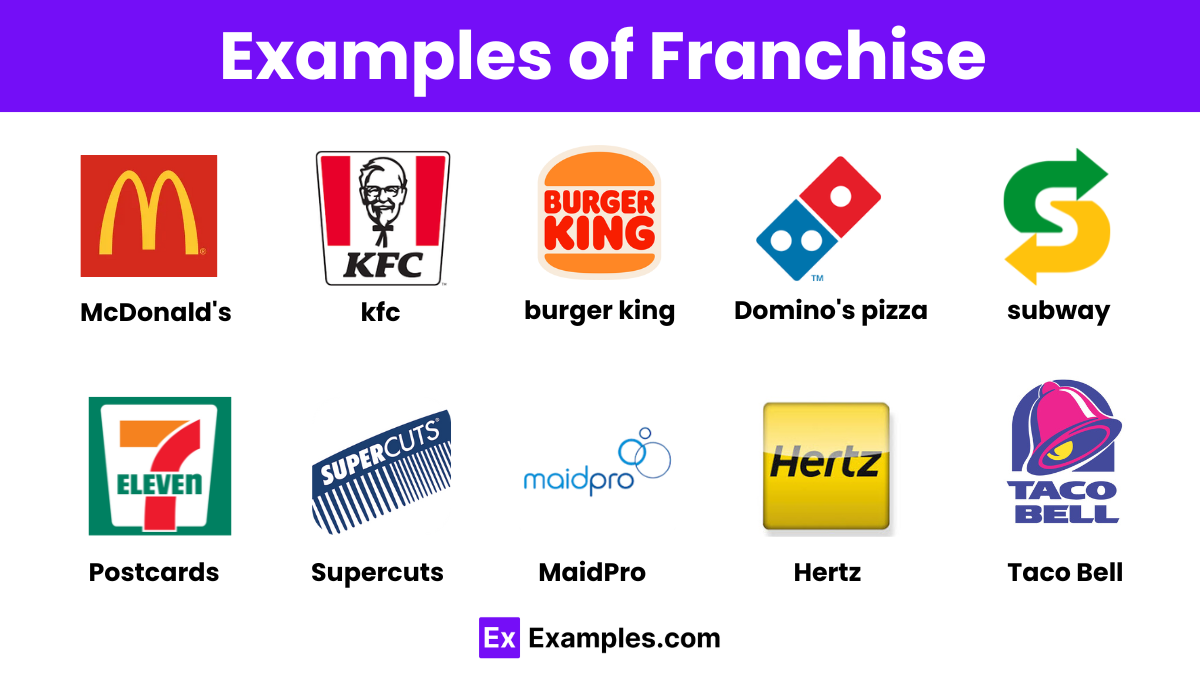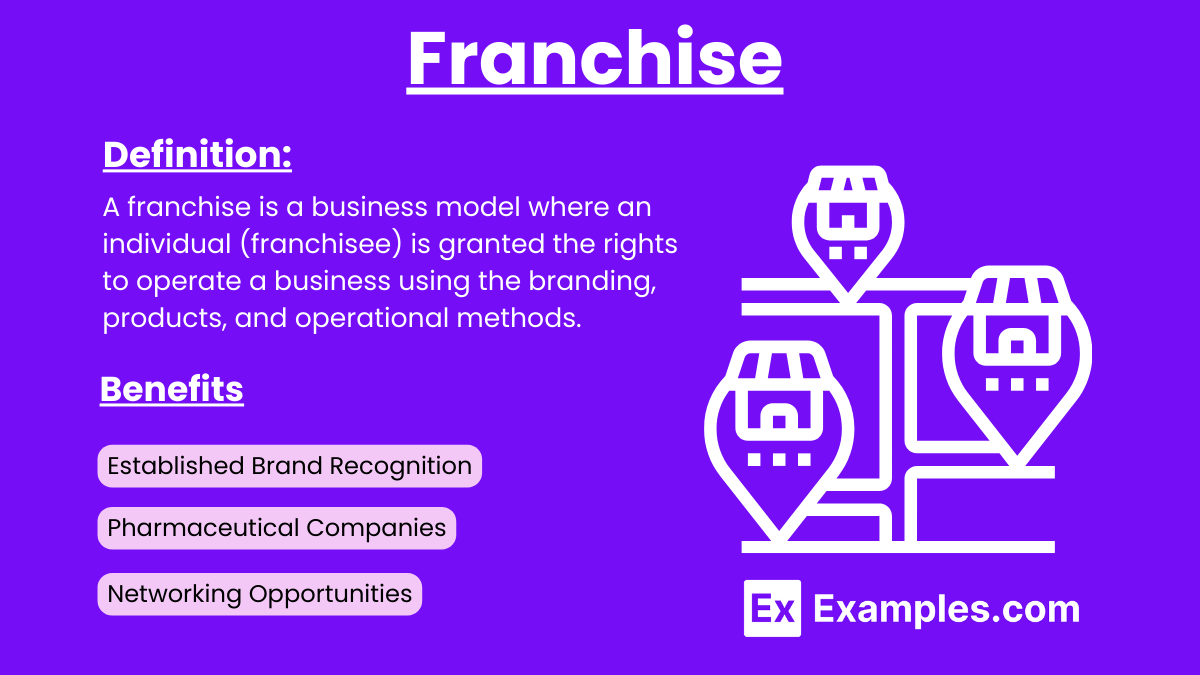55+ Franchise Examples to Download
A franchise is a business model where a company (the franchisor) grants an individual or entity (the franchisee) the rights to operate a business using its brand, products, and operational methods. This model allows franchisees to benefit from an established brand and proven business processes. Franchise Asset Purchase Agreement, which outlines the terms for purchasing franchise assets, the Franchise Proposal, which presents the business opportunity, the Franchise Business Plan, which details the operational strategy, and the Franchise Agreement, which legally binds the franchisor and franchisee.
What is Franchise?
A franchise is a business arrangement where a company (the franchisor) grants an individual or entity. the right to operate a business using its brand, products, and business model. This setup allows the franchisee to leverage the established reputation and support of the franchisor.
Examples of Franchise

- McDonald’s – Fast food restaurants
- Subway – Sandwich shops
- Starbucks – Coffeehouses
- Burger King – Fast food burgers
- 7-Eleven – Convenience stores
- Dunkin’ – Coffee and donuts
- Pizza Hut – Pizza restaurants
- KFC – Fried chicken restaurants
- Domino’s Pizza – Pizza delivery and carryout
- Marriott International – Hotels and resorts
- Holiday Inn – Hotels
- Supercuts – Hair salons
- The UPS Store – Shipping and business services
- RE/MAX – Real estate
- Hertz – Car rental services
- MaidPro – Cleaning services
- Anytime Fitness – Gyms and fitness centers
- Planet Fitness – Gyms
- Jiffy Lube – Automotive services
- Century 21 – Real estate
- Taco Bell – Fast food Mexican cuisine
- Wingstop – Chicken wings restaurants
- Great Clips – Hair salons
- H&R Block – Tax preparation services
- Ace Hardware – Hardware stores
- Gold’s Gym – Fitness centers
- Papa John’s Pizza – Pizza restaurants
- TGI Fridays – Casual dining restaurants
- Childcare Network – Childcare services
- Cold Stone Creamery – Ice cream shops
Retail Franchise Examples
- McDonald’s
- 7-Eleven
- Subway
- The UPS Store
- Starbucks
- Dunkin’
- Anytime Fitness
- Ace Hardware
- RE/MAX
- Great Clips
What is the Relationship Between Franchisee/Franchisor
The relationship between a franchisee and franchisor is a mutually beneficial business partnership. The franchisor provides the franchisee with the rights to use its brand, products, and business model. In return, the franchisee pays fees and royalties to the franchisor. The franchisor supports the franchisee with training, marketing, and operational guidance, ensuring consistency across the franchise network. The franchisee operates the business according to the franchisor’s standards, contributing to the brand’s overall success and reputation. This collaborative relationship drives growth and profitability for both parties.
Benefits of Franchisee
- Established Brand Recognition: Franchisees benefit from the immediate recognition and credibility of an established brand, reducing the time and effort needed to build a reputation.
- Proven Business Model: Operating under a tested and successful business model minimizes risks and enhances the chances of success.
- Training and Support: Franchisors provide comprehensive training and ongoing support, covering everything from operations to marketing strategies.
- Marketing Assistance: Franchisees gain access to national and regional marketing campaigns, which helps attract customers and increase sales.
- Bulk Purchasing Power: Franchisees can take advantage of the franchisor’s bulk purchasing agreements, leading to reduced costs for supplies and products.
- Easier Financing: Banks and financial institutions are often more willing to lend to franchisees due to the reduced risk associated with an established brand.
- Networking Opportunities: Franchisees become part of a larger network of franchisees, allowing for the exchange of ideas, strategies, and best practices.
- Operational Support: Franchisors often provide detailed operational manuals and guidelines, ensuring franchisees adhere to the brand’s standards and procedures.
- Higher Success Rate: Statistics show that franchises generally have a higher success rate compared to independent businesses due to the structured support system.
- Ongoing Innovation: Franchisors continuously innovate and update their business model, ensuring that franchisees stay competitive in the market.
Responsibilities of Franchisee
Adherence to Brand Standards: Franchisees must operate their business in accordance with the franchisor’s established brand guidelines, including signage, uniforms, product offerings, and service quality.
Payment of Fees: Franchisees are responsible for paying initial franchise fees, ongoing royalties, and any other agreed-upon payments to the franchisor as outlined in the Franchise Agreement.
Compliance with Operational Procedures: Franchisees must follow the operational manuals and procedures provided by the franchisor to maintain consistency and quality across the franchise network.
Local Marketing and Promotion: While the franchisor may handle national marketing, franchisees often need to engage in local marketing efforts to attract customers in their specific area.
Hiring and Training Staff: Franchisees are responsible for recruiting, hiring, and training their staff to ensure they meet the standards and expectations of the franchise.
Maintaining Financial Records: Franchisees must keep accurate and up-to-date financial records, which are often reviewed by the franchisor to ensure the business is operating effectively.
Customer Service: Providing excellent customer service is crucial. Franchisees must ensure their customers have a positive experience to maintain the reputation of the brand.
Reporting to Franchisor: Regularly reporting sales figures, financial performance, and other relevant data to the franchisor is essential for maintaining transparency and receiving necessary support.
Upholding Legal and Ethical Standards: Franchisees must comply with all local, state, and federal laws, including labor laws, health and safety regulations, and ethical business practices.
Engagement with the Franchise Community: Active participation in franchise meetings, training sessions, and other events helps franchisees stay updated on best practices and new developments within the franchise system.
International Franchising
International franchising allows businesses to expand their brand and operations into new global markets. Here are some prominent examples of companies that have successfully utilized international franchising:
Examples of International Franchises
- McDonald’s
- Starbucks
- Subway
- KFC
- Pizza Hut
- Domino’s Pizza
- Burger King
- 7-Eleven
- Dunkin’
- The Body Shop
Franchising in India
India is a rapidly growing market with immense potential for franchising. The country’s diverse population, rising middle class, and increasing urbanization make it an attractive destination for international and domestic franchises.
Prominent Franchise Examples in India
- McDonald’s
- Domino’s Pizza
- Subway
- KFC
- Pizza Hut
- Baskin Robbins
- The Coffee Bean & Tea Leaf
- Kidzania
- Archies
- Lenskart
Challenges of Franchising
- Regulatory Environment: Navigating complex and varied regulations across states.
- Cultural Diversity: Adapting products and services to suit diverse regional tastes and preferences.
- Supply Chain Management: Establishing efficient supply chains to ensure consistent product quality.
- Real Estate Costs: High rental and property costs in urban areas.
- Competition: Facing competition from both established international brands and local businesses.
Key Sectors for Franchising
- Food and Beverage: Fast food, casual dining, and café chains are highly popular.
- Education: Tutoring centers, preschools, and vocational training institutes.
- Health and Wellness: Gyms, fitness centers, and wellness spas.
- Retail: Apparel, accessories, and convenience stores.
- Beauty and Personal Care: Salons, spas, and cosmetic clinics.
- Entertainment and Leisure: Amusement parks, gaming zones, and entertainment centers.
Steps to Successful Franchising
- Market Research: Conduct thorough research to understand local consumer behavior and preferences.
- Regulatory Compliance: Ensure adherence to national and state-level regulations.
- Local Partnerships: Collaborate with local partners to gain market insights and operational support.
- Adaptation: Customize products, services, and marketing strategies to suit local tastes.
- Training and Support: Provide comprehensive training and continuous support to franchisees.
- Supply Chain Development: Establish reliable supply chains to maintain product quality.
- Marketing Strategy: Develop localized marketing campaigns to attract and retain customers.
What is a Restaurant Franchise?
A restaurant franchise allows individuals to operate a restaurant under an established brand, following the franchisor’s business model, standards, and procedures.
How do I start a Restaurant Franchise?
To start a restaurant franchise, you need to choose a brand, meet their requirements, sign a Franchise Asset Purchase Agreement, and undergo training.
What is a Franchise Asset Purchase Agreement?
A Franchise Asset Purchase Agreement is a contract that outlines the sale and transfer of assets from the franchisor to the franchisee, detailing the terms and conditions.
What are the benefits of a Restaurant Franchise?
Benefits include brand recognition, established business model, training, marketing support, and ongoing operational assistance from the franchisor.
How much does it cost to open a Restaurant Franchise?
The cost varies widely, depending on the brand, location, and other factors. Costs include franchise fees, equipment, real estate, and initial inventory.
What support do I get from the franchisor?
Franchisors provide training, marketing support, operational assistance, and access to a supply chain, ensuring consistency and quality across all franchise locations.
What should I consider before signing a Franchise Asset Purchase Agreement?
Consider the terms of the agreement, including fees, obligations, duration, renewal conditions, and the franchisor’s support and training programs.
Can I own multiple Restaurant Franchises?
Yes, many franchisors offer multi-unit franchising opportunities, allowing you to own and operate multiple franchise locations under the same brand.
How long is a typical Franchise Agreement?
A typical franchise agreement lasts between 5 to 20 years, with options for renewal based on performance and adherence to brand standards.
What is the difference between a Franchise Agreement and a Franchise Asset Purchase Agreement?
A Franchise Agreement outlines the rights and responsibilities of both parties, while a Franchise Asset Purchase Agreement details the sale and transfer of specific assets.


